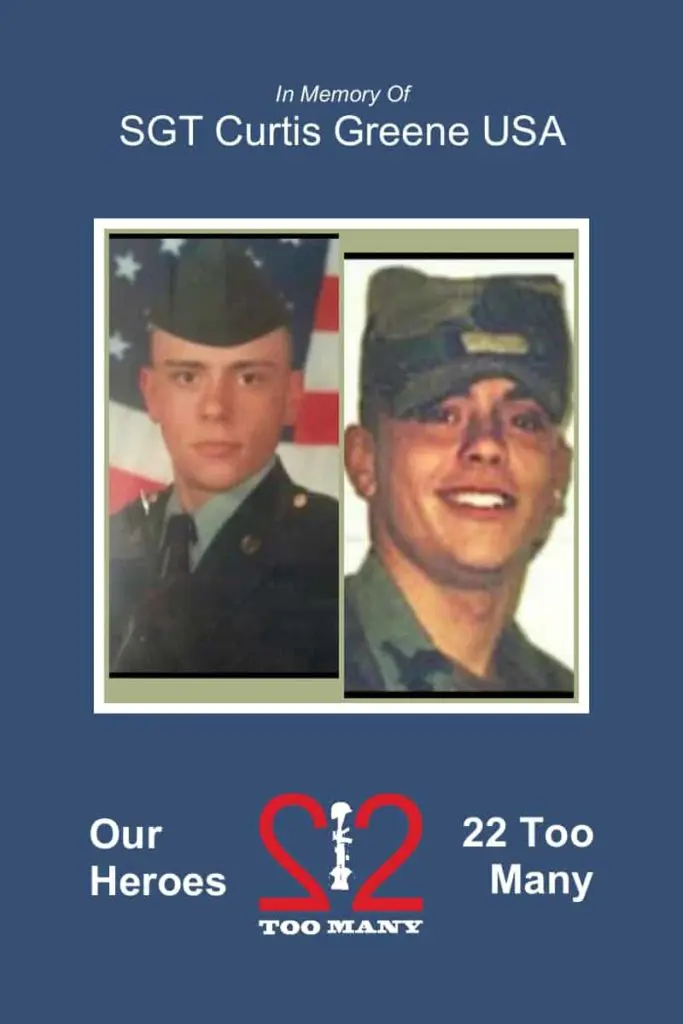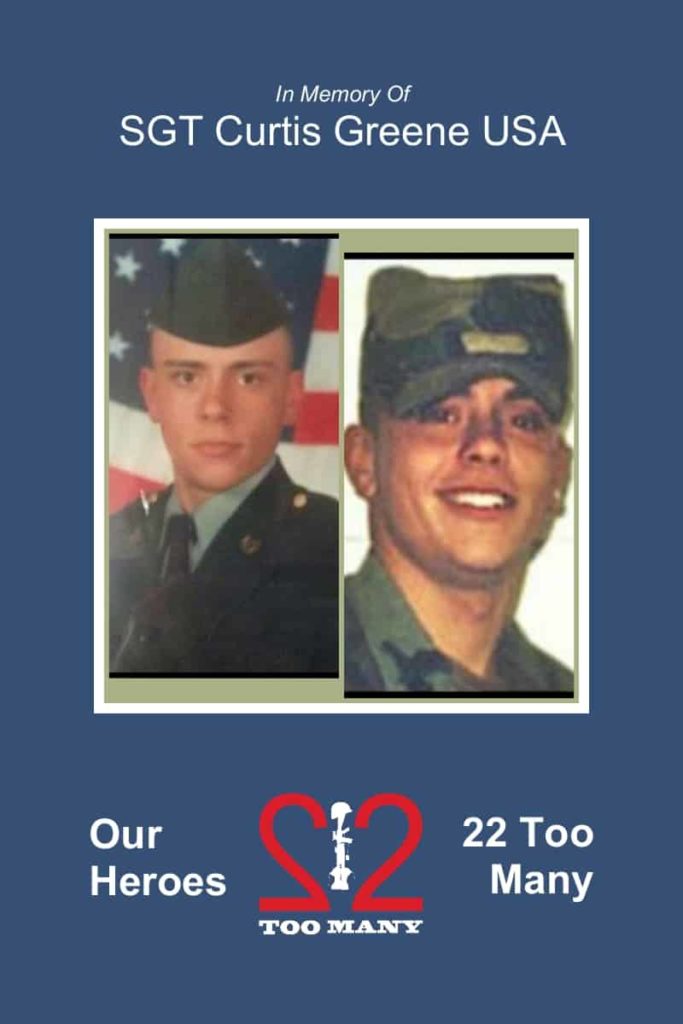Hometown: Roanoke, Virginia Graduated high school at Jordan Matthews High School, Siler City North Carolina. Curtis enjoyed spending time with family and friends, classic rock & alternative music, surfing, baseball (White Sox), football (Virginia Tech, Tampa Bay Buccaneers), and he loved to travel.
One night SGT Greene disappeared from their home outside Fort Riley, Kan. His wife, and the kids went to stay at her father’s house in Hernando County, Florida. When he called her to apologize for running out, he promised he would come home to Fort Riley. But he wasn’t about to return to Iraq. “Over my dead body are they going to make me go back.” On Dec. 6, he showed up for work, his uniform pressed, his boots polished. He sang cadence. That night, he was found hanging in his barracks. Sgt. Curtis Greene, 331st Signal Company, was 25.
He asked about joining the military right out of high school in Siler City, N.C. Sgt. Greene enlisted in the Army in the fall of 1997 and met Lisset Rivera the following year. Both were stationed in Germany, she working supply, he in communications. They were married in a small civil ceremony in Germany early in 2000. Back in the states, Sgt. Greene took to Anthony, Lisset’s son from a previous relationship. It was long absences from Anthony, who lived with Lisset’s parents when she was stationed abroad, that convinced her to leave the military. Sgt. Greene stayed in. He told Lisset the Army provided him with structure and stability. “He loved the military,” she said. “He would praise it. “The family moved to Fort Hood, Texas, where as a member of the 16th Signal Battalion, Sgt. Greene earned a reputation as a strict taskmaster.
The details of what Sgt. Greene experienced during his eight months in Iraq are unclear. Boggs, a fellow soldier, said he was stationed in Fallujah and Ramadi, while Sgt. Greene built communications networks near the Jordanian border. They talked often, but Boggs said his friend never went into detail about what he witnessed, just that he hated it there. Sgt. Greene told his stepfather that he had to kill a few people, and that the guilt was weighing on him. “Curtis seems to think that he was a murderer,” his stepfather said. “Curtis was raised to respect life; in the military you’re taught to take it. I think he struggled with that.” Lisset said her husband shared his worst experience: A soldier next to him was shot in the face and died instantly. He told her he screamed until he got to his destination, then watched as the man was placed in a body bag. He felt guilty because they had switched seats in the car shortly before the shooting. “He said they treated the body like a bag of trash,” she said. “He said that he was supposed to be in the passenger seat, and the bullet was for him.” Sgt. Greene’s family said he never talked to them about depression while he was deployed. But one thing is certain: He wanted out of Iraq. He got out of his Texas-based battalion after about eight months by re-enlisting in the Army, Lisset said. He was able to return to the United States by signing up for another three years with the 331st Signal Company, 1st Brigade, 1st Infantry Division, stationed at Fort Riley, she said. He seemed “normal” when he returned from Iraq in December 2003, she said. He finally met his newborn daughter, Laila, and couldn’t stop gushing about her. But after they moved to Fort Riley . . .”He changed; he changed,” Donald Greene said. “He was just in the ozone, so to speak. He was detached, in turmoil inwardly.” Lisset said he had nightmares and couldn’t sleep. He cried easily, but avoided talking about Iraq. “He just said it was ugly, and that you don’t know what it’s like until you’re there,” she said. “He always said he wouldn’t wish it on his worst enemy.” When the evening news reported deaths in Iraq, he would weep and ask her to turn off the TV. “He really cried, like it was someone he knew,” she said. “He’d say that we shouldn’t be there. He always wanted to know why we were there.” He was terrified.” Sgt. Greene did reach out for help after he returned from Iraq. He began seeing a psychiatrist – though he hid it from his wife. Lisset discovered prescription bottles of antidepressants and sleeping pills in their home. He told her he had started getting therapy and had been diagnosed with post-traumatic stress disorder. She said he wanted out of the Army, but finances were tight. He took off in the middle of the night, leaving Lisset and the kids in Kansas. He drove to Virginia and told his family there that he had “gotten out of the military.”
By the time he called Lisset, she had taken the kids to stay with her father in Spring Hill. She begged him to return to the base, worried he would be arrested for going AWOL. He did go back, and told her his punishment would be working extra duty. He called the next day, Dec. 6, and asked about their future together. Lisset said she loved him but thought he needed counseling. He agreed, but said he believed she would be better off without him. He hung up. She tried repeatedly to call him back, but there was no answer. Four hours later, fellow soldiers found him dead, hanging in his barracks. Sgt. Curtis Greene is buried at Florida National Cemetery near Bushnell.
http://www.iraqwarheroes.org/greenec.htm
http://pissedoffcombatveterans.com/id18.html
#22toomany#OurHeroes are #NeverForgotten


